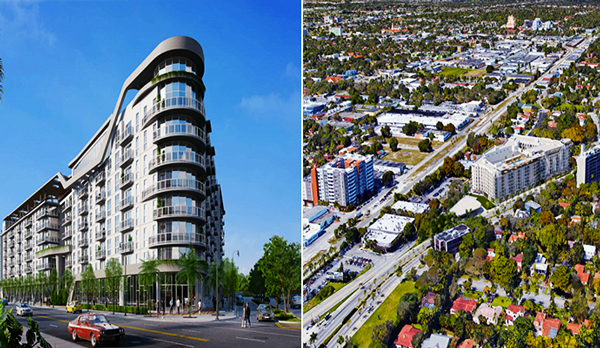Trending
Missoni Baia, Paseo Miami and Coconut Grove Playhouse submit new plans
13th Floor and Tricera are now planning Paseo Miami on the former Boulevard 57 condo site

The developers of three major projects will go before the city of Miami next week for approval from the Urban Development Review Board on Wednesday.

Missoni Baia
Missoni Baia
700 Edgewater Development LLC, a company tied to developer Vlad Doronin, filed updated plans for Missoni Baia, a 56-story luxury condo tower planned for 700 Northeast 26th Terrace in Edgewater.
The developer is formally requesting a change in units and minor design modifications to the building. Instead of a 146-unit tower tower with about 771,000 square feet and 323 parking spaces, Doronin’s company is looking to build 249 units with 838,000 square feet and 399 parking spaces, citing “shifting market conditions and an increase in demand for smaller units.”
Doronin’s OKO Group broke ground on the building in October. Amenities will include a flow-through deck with cabanas, five swimming pools, an elevated tennis court, fitness center and spa. OKO launched sales for Missoni Baia in the spring of 2016 and hired Fortune International Group to take over sales about a year ago.

Paseo Miami
Paseo Miami
13th Floor Investments submitted its proposal for Paseo Miami, a mixed-use apartment development planned in Miami’s Upper East Side.
The eight-story, 448,000-square-foot project calls for 294 residential units, about 27,000 square feet of retail space, 21,000 square feet of open space and 517 parking spaces.
13th Floor and Tricera Capital paid $19.5 million for the 2.2-acre development site at 5700 Biscayne Boulevard in June. They bought it from Unitas Development Group, which had planned to build the Boulevard 57 condo development there.

Coconut Grove Playhouse
Coconut Grove Playhouse
The Miami-Dade County Department of Cultural Affairs and Arquitectonica revealed new renderings and a detailed site plan of the Coconut Grove Playhouse project.
In December, the Miami City Commission moved to preserve the exterior facade of the theater, killing a $20 million plan that entailed razing the playhouse’s deteriorated 1,100-seat auditorium and replacing it with a modern 300-seat theater.
The city preservation board’s conditions now call for a 600-seat theater that would sit within the fully restored auditorium building.
The state-owned property stopped operating as a theater in 2006 after accruing overwhelming debt. Ownership later reverted to the state, and the county partnered with Florida International University to redevelop the theater.




